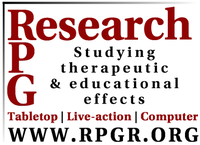List of Created Autism Spectrum Program Plans Utilizing Role-playing Games as Intervention Modalities From a Therapeutic Recreation Approach
This prototype was reviewed and play-tested by Professor Emily Messina, Director of the Therapeutic Recreation for Eastern Washington University.
.
The ASD guardians would like Hawke Robinson to come to Tacoma to implement this program plan, but due to the logistics (he resides in Spokane Washington on the other side of the state), has not yet been able to implement this program. The PAVE group does not have a formal facility, they utilize churches and other ASD guardians' homes for some activities, but generally arrange to meet at facilities for activities periodically. This is one of the reasons why The RPG Research Trailer would be very useful in helping to actually implement programs such as this.
Program plan development and implementation previewed, monitored, and reviewed by program members, volunteers, classmates, and Professor Emily Messina, Director of the Therapeutic Recreation Department for Eastern Washington University. The LARP program run simultaneously in parallel to several other activity programs created by other groups, in a large gym/dance-hall. Participants rotated from group-to-group every 15 minutes. While participants lost focus/interest in all the non-LARP activities within an average of 5 minutes (indicated typical by the ASD program's representatives), when the participants engaged in the LARP-adapted activities other results were immediately observed and comment upon by the ASD program representatives.
Immediately observed results during program implementation:
- Noted immediate reduction in presentation of significant stereotypical behaviours (hand-flapping, fixation, distraction, lack of response/interaction to/with others, etc.) during the activities using RPG-based activities compared to those activities without
- Better positive experiences with cooperative engagement using RPG-based activities than those without
- Better success rates at completing all tasks cooperatively with RPG approach compared to non-RPG activities (all but one participant completed all tasks successfully, and all maintained attention and focus for full duration of a 15 minute session rotation, compared to average of only 5 minutes for all the other groups running non-RPG-related activities.
- Noted improvement in interaction and communication with other participants when using the RPG-related adapted activities than those without.
- Better response and success rates in complying with instructions to correctly complete multi-staged activities.
Program plan utilizes tabletop and live-action role-playing game sessions to help Autism Spectrum Disorder (ASD) participants build up confidence and competence toward improved autonomy through use the public transit system.
This adventure activity begins by using tabletop RPG for phase I, and then Live-action role-playing (LARP) (actually using the buses) for the final phase II.
The original version of this program plan was reviewed by Professor Emily Messina, Director of the Therapeutic Recreation for Eastern Washington University.
It has also been reviewed by the Tacoma PAVE Group for addition to their programming schedule. The ASD guardians would like Hawke Robinson to come to Tacoma to implement the program plan, but due to the logistics (he resides in Spokane Washington on the other side of the state), has not yet been able to implement this program. The PAVE group does not have a formal facility, they utilize churches and other ASD guardians' homes for some activities, but generally arrange to meet at facilities for activities periodically. This is one of the reasons why The RPG Research Trailer would be very useful in helping to actually implement programs such as this.
If you know of other programs with similar approaches (using RPG for ASD), please let me know, and I will gladly add a link to your information to this article. Thank you!
Disclaimers: http://www2.rpgresearch.com/about/disclaimers
About Hawke Robinson: http://rpgr.org/staff/hawke-robinson
Additional Programs of Note
The following programs do not necessarily use Therapeutic Recreation methodologies, but are from related efforts.
Wheelhouse Workshop
http://www.wheelhouse-workshop.com/whatwedo
Using tabletop role-playing games for at-risk and Autism spectrum youth. The duo running this program have Masters in Drama Therapy, and Family Therapy respectively.
Israeli Romach Program
http://rpgresearch.com/blog/israeli-group-attempting-to-use-rpgs-as-therapy-tool
Using tabletop role-playing games for at-risk and Autism spectrum youth.
Japanese Research by Kohei Kato
http://rpgresearch.com/blog/japanese-researcher-shows-rpg-effective-for-helping-autism-spectrum
Significant, measurable, results from a Recent Research project from Japanese researcher Kohei Kato, "Does the tabletop role-playing game activity enhance quality of life in children with autism spectrum disorder?" - http://sne-gakugei.jp/activities/2015/06/20150609172034.html & https://www.facebook.com/comgame2014?__mref=message_bubble
Document Actions

